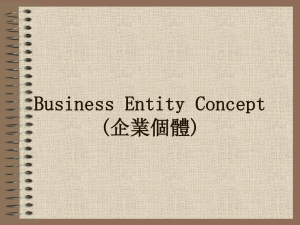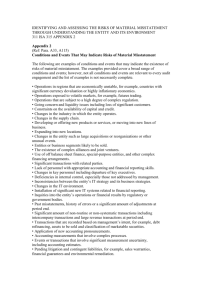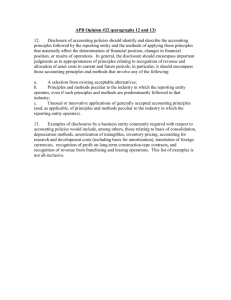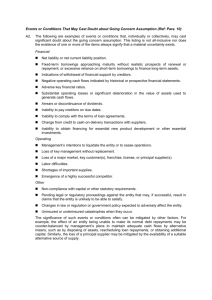Two Businesses = Two Business Entities
advertisement
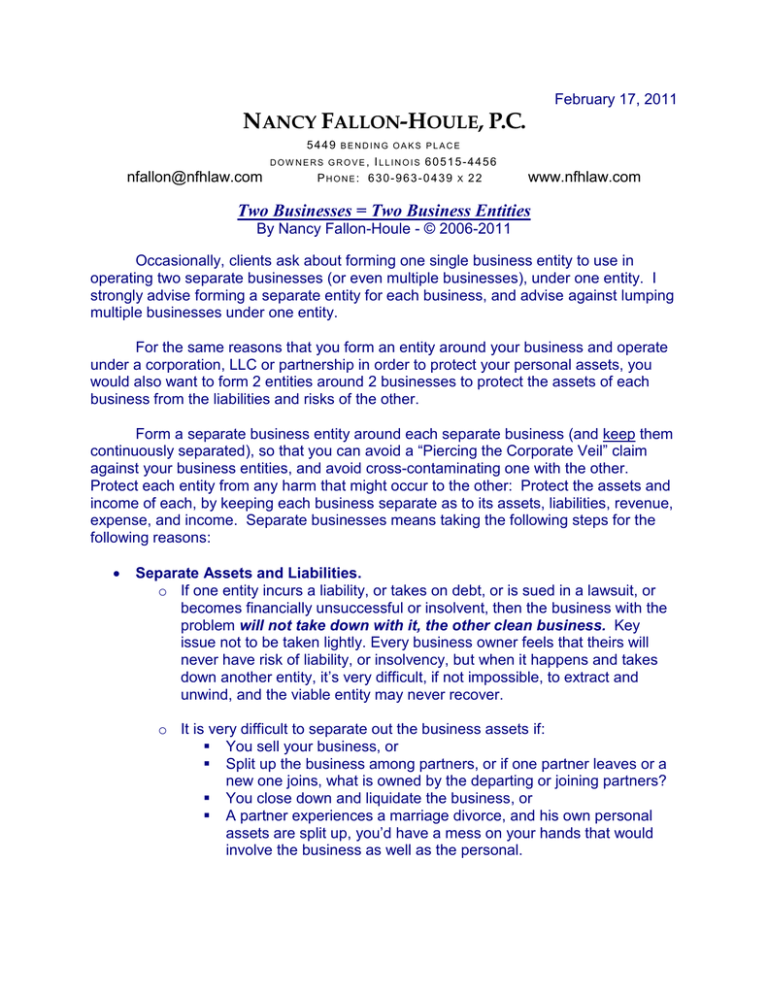
February 17, 2011 NANCY FALLON-HOULE, P.C. 5449 BENDING OAKS PLACE DOW NERS GROVE, nfallon@nfhlaw.com ILLINOIS 60515-4456 PHONE: 630-963-0439 X 22 www.nfhlaw.com Two Businesses = Two Business Entities By Nancy Fallon-Houle - © 2006-2011 Occasionally, clients ask about forming one single business entity to use in operating two separate businesses (or even multiple businesses), under one entity. I strongly advise forming a separate entity for each business, and advise against lumping multiple businesses under one entity. For the same reasons that you form an entity around your business and operate under a corporation, LLC or partnership in order to protect your personal assets, you would also want to form 2 entities around 2 businesses to protect the assets of each business from the liabilities and risks of the other. Form a separate business entity around each separate business (and keep them continuously separated), so that you can avoid a “Piercing the Corporate Veil” claim against your business entities, and avoid cross-contaminating one with the other. Protect each entity from any harm that might occur to the other: Protect the assets and income of each, by keeping each business separate as to its assets, liabilities, revenue, expense, and income. Separate businesses means taking the following steps for the following reasons: Separate Assets and Liabilities. o If one entity incurs a liability, or takes on debt, or is sued in a lawsuit, or becomes financially unsuccessful or insolvent, then the business with the problem will not take down with it, the other clean business. Key issue not to be taken lightly. Every business owner feels that theirs will never have risk of liability, or insolvency, but when it happens and takes down another entity, it’s very difficult, if not impossible, to extract and unwind, and the viable entity may never recover. o It is very difficult to separate out the business assets if: You sell your business, or Split up the business among partners, or if one partner leaves or a new one joins, what is owned by the departing or joining partners? You close down and liquidate the business, or A partner experiences a marriage divorce, and his own personal assets are split up, you’d have a mess on your hands that would involve the business as well as the personal. Two Businesses = Two Business Entities Separate Debts. If one incurs debts, and should become unsuccessful, a separate entity keeps the other company from going down with the unsuccessful one. Separate Legal Liability, in case of customer dispute, product claim, lawsuit, employee liability, insurance liability claim and tax claim, against one entity, then the other will not be financially involved, or risk insolvency, or incur an insurance incident hit that may affect its own rates. Separation of Insurable events. It is difficult to obtain insurance on two kinds of businesses under one roof, and more costly to do so. Essentially, both entities must be insured for all types of claims that both businesses could incur. While separating the two companies, into two types, each is insured separately, at a lower cost to both. Savings in insurance premiums alone can cover the cost of the second entity formation. Separate Revenue and expenses. If two businesses under one entity how would you: o Record, and keep track of, income for each business? o Record salaries attributable to each? o Record rent attributable to each? Although if you share office space, you can charge a percentage of the rent separately to each business. o Keep expenses separated that are applicable to one business or the other? You can theoretically pay all expenses from one entity, and theoretically allocate proportionally the business expenses to each entity. But this approach takes more bookkeeping work (more time and cost of the bookkeeper away from doing items toward the business), more work for the accountants at tax time (and more cost to the company), and more likely to cause confusion and scrutiny by lenders, investors or IRS. You will easily spend more money in accounting fees and bookkeeping fees after a year or two, more than the cost of forming the second entity. Income tax Returns. Each should be separate (unless you are filing as a single member LLC that is deemed “disregarded” under tax law.) Financial Statements and measures of profitability will be instructive if they only include one entity. Separate financial records of revenue, income and expense. Also separate projections, and analysis of revenue, expense and profit centers): Difficult to keep expenses and income properly separated and allocated if things are all charged under one entity. Avoid confusion by external parties, such as your customers, vendors, lenders, as to your corporate identity and the focus of your business. How to establish 2 Two Businesses = Two Business Entities brand identity without confusing the customers, if multiple businesses under one entity. How to avoid the perception of “we try to do everything and can’t” or “jack of all trades, masters of nothing”. Separate books, when any of the above parties will ask for financial statements, in order to extend to your business a loan, trade credit, vendor credit, or even some larger customers ask for financials. They would all want separate financial statements, which would be a nightmare to separate after the fact, to obtain business credit. Allows you to distinguish and brand the company’s name and business, in its industry, and therefore establish common law trademark protection rights to that name in the specific industry(s), and establish branding, and establish specialty or niche expertise. Business Description: If 2 businesses under 1 entity, how would you describe the business on the articles of formation, if multiple businesses are operated under one? The business description would be difficult, and somewhat odd or confusing, if you try to describe and operate two businesses under one business formation, website marketing materials: Customers or clients will think: This company is not sure what it does! Judgment Call Factors However, whether you should really be concerned about forming two corporations or LLCs, depends on the types of businesses, how risky each business is, how much business each will do, when the business is anticipated to start and how long it may continue, how your clients will perceive you if you do not incorporate, how they will pay you if you don’t, and whether one could work as a sole proprietorship. Important to talk to an accountant about whether the best structure for you would be an LLC or an S Corp for each type of business. For example, LLC is better for a business holding real estate or property, while a corporation is better for some other types of businesses, such as manufacturing and retail. Service providers, maybe LLC, maybe S Corp (See your tax advisor.) If we were forming two entities for you, we would give you a discount on the legal fees on the second one, if the addresses are the same, even though we’d need to change the name of the owners and signers. 3



